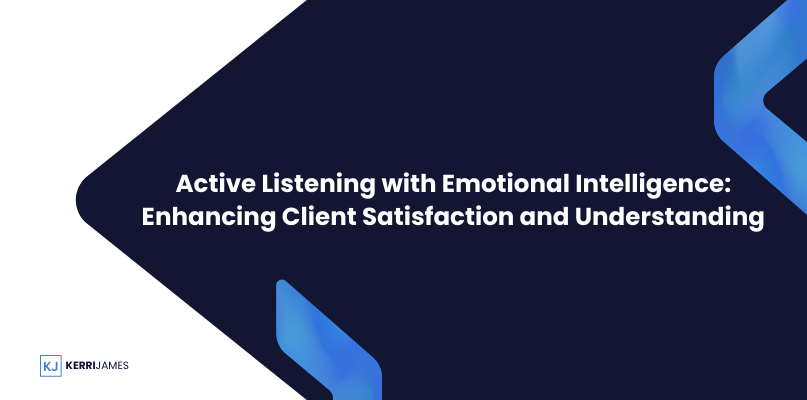In the complex and often emotionally charged landscape of legal practice, effective communication is paramount. While legal expertise and strategic thinking are essential, the ability to truly listen to clients, understanding not only their words but also their underlying emotions, needs, and concerns, is a crucial differentiator that sets exceptional legal professionals apart. Active listening, combined with the power of emotional intelligence (EI), transforms client interactions, builds trust, fosters collaboration, and ultimately leads to increased client satisfaction, loyalty, and positive outcomes. This comprehensive article delves into the art of active listening with emotional intelligence, exploring its core components, practical applications in legal settings, and the profound impact it can have on client relationships and the success of a legal practice. By mastering the skills of active listening and cultivating emotional intelligence, legal professionals can create a more client-centered, empathetic, and effective approach to legal representation.
Beyond Hearing: The Essence of Active Listening
Active listening is not merely hearing the words a client speaks; it’s a conscious, engaged, and empathetic process of receiving, processing, and responding to both the verbal and nonverbal messages they convey. It involves paying close attention not only to the content of their words but also to the tone of their voice, their body language, their facial expressions, and the subtle emotional cues that often reveal more than words alone. Active listening requires focused attention, a genuine desire to understand the client’s perspective, and the ability to suspend judgment and preconceived notions. In the legal field, where clients often face stressful, emotionally charged situations, active listening is not just a valuable skill; it’s a fundamental requirement for building trust, demonstrating empathy, providing effective legal representation, and fostering strong client relationships.
The Power of Emotional Intelligence: Enhancing Active Listening and Client Connections
Emotional intelligence (EI) is the ability to perceive, understand, manage, and effectively utilize emotions, both your own and those of others. It’s a crucial competency for legal professionals, amplifying the effectiveness of active listening and transforming client interactions. EI empowers legal teams to:
Recognize and Understand Client Emotions: EI enables legal professionals to accurately perceive and interpret client emotions, even when those emotions are not explicitly expressed verbally. By recognizing subtle emotional cues, such as changes in tone of voice, body language, or facial expressions, attorneys can gain a deeper understanding of the client’s emotional state and respond with empathy and understanding.
Manage Your Own Emotional Responses: The emotionally charged nature of legal proceedings can evoke strong emotional responses in legal professionals. EI equips attorneys with the self-regulation skills to manage their own emotions effectively, avoiding countertransference (projecting their own emotions onto the client), maintaining composure under pressure, and creating a safe and supportive environment for clients to express their feelings openly.
Build Rapport and Trust: EI enhances the ability to build rapport and establish trust with clients. By demonstrating empathy, actively listening to client concerns, and responding with sensitivity and understanding, attorneys can create a strong foundation for a positive and collaborative attorney-client relationship.
Navigate Difficult Conversations with Skill and Empathy: EI enables legal professionals to navigate challenging conversations, such as delivering bad news or addressing client disagreements, with greater skill and empathy. By understanding and responding to the client’s emotional state, attorneys can minimize emotional distress, preserve the relationship, and work towards mutually acceptable solutions.
The Synergistic Interplay of Active Listening and Emotional Intelligence:
Active listening and emotional intelligence work synergistically to enhance client communication and build stronger relationships:
- Empathetic Listening: EI enhances active listening by enabling attorneys to not only hear the client’s words but also to understand the emotional context behind those words. This empathetic listening creates a deeper connection, fostering trust and encouraging open communication.
- Nonverbal Communication Awareness: EI sharpens the ability to interpret nonverbal cues, such as body language, facial expressions, and tone of voice, providing valuable insights into the client’s emotional state and unspoken concerns. This enhanced awareness allows attorneys to respond more effectively to the client’s needs.
- Emotional Validation: EI empowers legal professionals to validate client emotions, acknowledging and respecting their feelings even if they don’t necessarily agree with their perspective. This validation builds rapport, reduces defensiveness, and creates a safe space for open dialogue.
- Improved Communication Clarity: By understanding the client’s emotional state and tailoring their communication style accordingly, emotionally intelligent attorneys can communicate more clearly and effectively, minimizing misunderstandings and ensuring that their message is received as intended.
Practical Applications in Legal Settings: Real-World Scenarios
Initial Client Consultations: Creating a Positive First Impression: The initial consultation sets the tone for the entire attorney-client relationship. Active listening, combined with EI, allows attorneys to create a welcoming and supportive environment, building rapport from the outset. By actively listening to the client’s story, asking clarifying questions, and demonstrating genuine empathy, attorneys can establish trust, gather crucial information, and understand the client’s needs and goals.
Delivering Difficult News: Navigating Sensitive Conversations with Compassion: Delivering bad news or discussing sensitive topics requires a high degree of emotional intelligence and skillful communication. Active listening allows attorneys to gauge the client’s emotional state and tailor their delivery accordingly. Expressing empathy, validating the client’s feelings, and offering support can help mitigate emotional distress and preserve the relationship.
Managing Client Anger and Frustration: De-escalating Conflict and Finding Solutions: Clients may sometimes express anger or frustration, particularly when facing stressful legal challenges. Active listening, combined with emotional regulation, allows attorneys to remain calm and composed in these situations. Acknowledging the client’s emotions, validating their feelings, and actively listening to their concerns can de-escalate conflict and create an opportunity to find mutually acceptable solutions.
Negotiations and Mediation: Understanding Perspectives and Building Bridges: Active listening and EI are essential for successful negotiations and mediation. By actively listening to the other party’s perspective, understanding their interests and needs, and managing their own emotions effectively, attorneys can facilitate productive dialogue, find common ground, and build bridges towards mutually beneficial agreements.
Building Long-Term Client Relationships: Fostering Trust, Loyalty, and Positive Referrals: Consistent active listening, combined with emotional intelligence, fosters trust, strengthens attorney-client relationships, and builds lasting client loyalty. Clients who feel heard, understood, and valued are more likely to return for future legal needs and refer others to your firm, contributing to your long-term success.
Developing Active Listening and Emotional Intelligence Skills: A Continuous Journey
Developing these crucial skills requires a commitment to ongoing learning, self-reflection, and a client-centered approach to legal practice.
Emotional Intelligence Assessments: Utilize validated EI assessments to identify individual and team strengths and weaknesses, providing a baseline for targeted development.
Targeted Training Programs: Implement training programs specifically focused on active listening skills, emotional intelligence, communication techniques, and empathy development. Incorporate role-playing exercises, case studies, and feedback sessions to enhance practical application and skill development.
Mentorship and Coaching: Pair experienced legal professionals who excel in active listening and EI with newer team members to provide guidance, support, and practical advice in real-world client interactions.
Creating a Culture of Empathy and Client-Centricity: Foster a firm culture that values and prioritizes active listening, emotional intelligence, client-centered communication, and a genuine commitment to understanding and meeting client needs. Encourage open communication, feedback, and continuous learning in these areas.
Measuring the Impact: Demonstrating the Value of Active Listening and Emotional Intelligence
Integrating active listening and emotional intelligence (EI) into a law firm’s practices can transform client relationships and enhance client satisfaction. However, to truly demonstrate the value of these skills, it’s essential to track specific metrics that capture their impact. By measuring client satisfaction, retention, and referrals, firms can gain insight into the effectiveness of their EI efforts and identify areas for continuous improvement.
Client Satisfaction Surveys
Client satisfaction surveys are a direct way to gather feedback on clients’ experiences with communication, empathy, and responsiveness. These surveys should include questions that explore clients’ perceptions of their attorney’s listening skills, empathy, and overall satisfaction with the service provided. Examples of survey questions include, “How well did your attorney understand your concerns?” or “Did you feel your attorney was responsive to your needs?”
Analyzing this feedback can reveal patterns in client satisfaction, highlight strengths, and pinpoint areas needing improvement. Additionally, tracking these results over time enables firms to assess progress and demonstrate the positive effects of EI-focused initiatives. Feedback from these surveys can also serve as training material, helping staff understand the real-world impact of their communication style on client experience.
Client Retention Rates
Monitoring client retention rates provides valuable insights into the loyalty and trust that active listening and EI foster. When clients feel heard, respected, and supported, they are more likely to return for future legal needs. By comparing retention rates over time and examining whether improvements in active listening and EI correlate with increased retention, firms can assess the impact of these skills on client loyalty.
Higher client retention not only suggests satisfaction but also reflects clients’ confidence in the firm’s commitment to understanding and meeting their needs. Retained clients often provide a stable source of business and referrals, reducing the firm’s reliance on new client acquisition and enhancing long-term growth.
Positive Client Testimonials and Referrals
The number of positive testimonials and referrals a firm receives can be a powerful indicator of client satisfaction. Clients who have had empathetic, client-centered experiences are more likely to share their positive experiences with others, either through written testimonials or by referring friends, family, and colleagues.
Tracking testimonials and referrals can reveal the extent to which clients are willing to recommend the firm based on their positive interactions. An increase in these metrics suggests that clients view the firm’s emphasis on active listening and EI as a valuable part of their experience. Positive testimonials not only bolster the firm’s reputation but also serve as social proof, attracting new clients who are seeking a firm known for its compassionate and effective representation.
Final Words: The Transformative Power of Listening with Empathy
In the complex, emotionally charged field of legal practice, active listening paired with empathy is more than a skill set—it’s a transformative approach that can profoundly change the client experience. Listening with empathy enables attorneys to build trust, enhance communication, foster collaboration, and ultimately increase client satisfaction, loyalty, and the likelihood of favorable outcomes. By cultivating these competencies, legal professionals not only set themselves apart in a competitive field but also create a more compassionate, client-centered, and effective practice.
Active listening with empathy goes beyond simply hearing words; it involves understanding the human experience behind those words. Clients often come to attorneys feeling vulnerable, anxious, or uncertain. In these moments, they need more than legal expertise—they need someone who genuinely listens, acknowledges their concerns, and offers emotional support. When an attorney listens with empathy, they create a safe space where clients feel heard and respected, which can significantly reduce the stress associated with legal matters.
Empathy-driven listening also strengthens communication, which is foundational in any successful attorney-client relationship. Clear, compassionate communication allows clients to feel comfortable discussing their fears, priorities, and desired outcomes, giving attorneys valuable insights into how best to represent them. By actively engaging with clients’ concerns and responding with empathy, attorneys can clarify complex information, address misunderstandings early, and prevent communication breakdowns that could otherwise impact the client’s experience and case outcome.
Furthermore, listening with empathy fosters collaboration. When clients feel understood, they are more likely to engage openly and participate actively in their case. This collaborative dynamic allows attorneys to tailor their approach to better align with the client’s unique goals, values, and emotional needs. It enables both the client and the attorney to work as a team, leading to more strategic, informed decision-making and stronger case strategies.
The benefits of empathy and active listening extend beyond individual cases, shaping a firm’s reputation and client loyalty. Clients who experience empathetic, client-centered service are more likely to return for future legal needs and to recommend the firm to others, creating a ripple effect that drives growth. In a profession where referrals and word-of-mouth reputation are essential, the ability to listen and connect with empathy can serve as a significant competitive advantage.
Ultimately, the transformative power of listening with empathy lies in its ability to humanize the legal process. By focusing on the client as a whole person—not just a case—legal professionals cultivate relationships that go beyond transactional interactions. This approach not only enhances the immediate client experience but also builds a foundation of trust and respect that benefits both the client and the firm over time.
In today’s fast-paced, often impersonal legal environment, attorneys who prioritize empathetic listening offer something rare and valuable: a sense of connection and care. By building bridges of understanding and trust, legal professionals create a practice that is both compassionate and effective, paving the way for meaningful, lasting client relationships and more positive outcomes.
Expanding on the Core Concepts and Benefits:
To further emphasize the importance of active listening with emotional intelligence, let’s delve deeper into the core components and benefits:
Active Listening: A Multifaceted Skill
Paying Attention: This goes beyond simply hearing the words; it involves being fully present in the moment, focusing on the speaker, and minimizing distractions. It includes observing nonverbal cues, such as body language and facial expressions.
Showing That You’re Listening: Use verbal and nonverbal cues to demonstrate your engagement, such as nodding, making eye contact, and using verbal affirmations like “I understand” or “Tell me more.”
Providing Feedback: Summarize and paraphrase the speaker’s message to ensure understanding and demonstrate that you’ve actively processed their words. Ask clarifying questions to delve deeper into their concerns and perspectives.
Deferring Judgment: Avoid interrupting, criticizing, or offering unsolicited advice. Create a safe and non-judgmental space for the client to express themselves fully.
Responding Appropriately: Respond to the client’s message with empathy, understanding, and a focus on solutions. Tailor your response to their emotional state and communication style.
Emotional Intelligence: The Key to Deeper Understanding
Self-Awareness: Understanding your own emotions and how they impact your interactions with clients is crucial for effective communication. Recognize your triggers, manage your stress, and avoid projecting your own emotions onto the client.
Self-Regulation: Control your emotional responses, particularly in challenging situations. Remain calm, composed, and professional, even when faced with anger, frustration, or other difficult emotions from the client.
Motivation: Maintain a positive and client-centered attitude, even in stressful situations. Demonstrate a genuine desire to help your clients and achieve the best possible outcomes for them.
Empathy: Put yourself in your client’s shoes, understanding their perspective, emotions, and underlying needs. Respond with compassion, validation, and support.
Social Skills: Build rapport, communicate effectively, and navigate social dynamics with skill and sensitivity. Develop strong relationships with clients based on trust, respect, and mutual understanding.
The Benefits of Active Listening with Emotional Intelligence: A Summary
Increased Client Satisfaction: Clients who feel heard, understood, and valued are more satisfied with their legal representation and the overall client experience.
Stronger Attorney-Client Relationships: Active listening and EI foster trust, rapport, and deeper connection, building stronger and more collaborative attorney-client relationships.
Improved Communication and Reduced Misunderstandings: By actively listening and understanding the client’s emotional state, attorneys can communicate more clearly and effectively, minimizing misunderstandings and ensuring that their message is received as intended.
Enhanced Problem-Solving and Decision-Making: A deeper understanding of the client’s perspective, needs, and goals enables attorneys to develop more effective legal strategies and make more informed decisions that align with the client’s best interests.
More Favorable Case Outcomes: Improved communication, trust, and collaboration can contribute to more favorable case outcomes, as attorneys are better equipped to understand the client’s objectives and advocate effectively on their behalf.
Increased Client Retention and Referrals: Clients who feel valued and understood are more likely to remain loyal to your firm and refer others to your services, generating positive word-of-mouth marketing and contributing to the firm’s growth and success.
Reduced Stress and Burnout for Legal Professionals: By developing strong EI skills and practicing active listening, attorneys can better manage their own emotional responses to stressful client situations, reducing stress, preventing burnout, and improving overall well-being.
Practical Tips for Implementing Active Listening with EI:
- Create a Safe and Confidential Space for Communication: Ensure that client meetings take place in a private and comfortable setting where clients feel safe to express their thoughts and emotions openly.
- Begin with an Open Mind: Approach each client interaction with an open mind, free from preconceived notions or judgments. Be prepared to listen to their story without interrupting or imposing your own interpretations.
- Focus on the Client, Not Your Response: Resist the urge to formulate your response while the client is speaking. Give them your undivided attention and focus on understanding their message fully before crafting your reply.
- Use Reflective Listening Techniques: Paraphrase and summarize the client’s statements to ensure understanding and demonstrate that you are actively listening. Reflect back their emotions to validate their feelings and create a deeper connection.
- Ask Clarifying Questions: Ask open-ended questions to encourage the client to elaborate on their concerns, perspectives, and goals. This demonstrates your genuine interest in understanding their situation fully.
- Be Mindful of Nonverbal Cues: Pay attention to the client’s body language, facial expressions, and tone of voice, as these nonverbal cues can provide valuable insights into their emotional state and unspoken needs.
- Practice Empathy: Consciously try to step into the client’s shoes and understand their experience from their perspective. Imagine how you would feel in their situation and respond with compassion and understanding.
- Manage Your Own Emotions: Be aware of your own emotional state and how it might impact your interactions with clients. Practice self-regulation techniques to manage stress, anxiety, and other emotions that could interfere with effective communication.
By consistently practicing active listening with emotional intelligence, legal professionals can transform client interactions, build stronger relationships, and create a more compassionate, client-centered, and successful legal practice. It’s an investment in your clients, your team, and the future of your firm.










